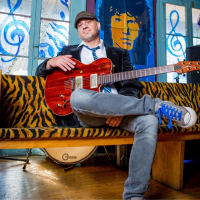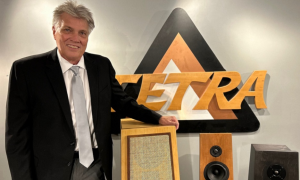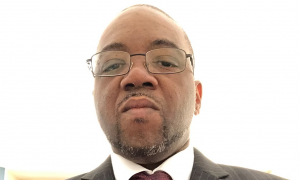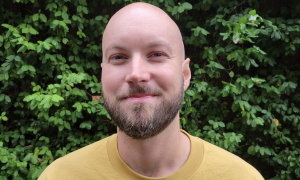Home » Jazz Articles » Chats with Cats » The Jazz Entrepreneur: Charles Carlini
The Jazz Entrepreneur: Charles Carlini

I book artists all the time and present them. It’s heartbreaking when I have to say, 'listen, you just don’t have the draw. You’re a fantastic musician but there’s a business side to it.'
—Charles Carlini
It was insightful to speak with Mr. Carlini who has navigated these choppy waters for decades. He's been a record producer, artist manager, and concert promoter along with other jobs outside of music. His entrepreneurial instincts have served him well by deftly pursuing burgeoning opportunities and—at the same time—recognizing time wasting dead ends. He still has a passion for music and likes to combine it with his passions for literature, food, and travel. He gave me a stark tutorial on the harsh reality of making a living in the jazz business.
About Charles Carlini
Music had been Charles Carlini's passion long before he became the CEO of his own multimedia company that has, as he puts it, "hands in many pies." In fact, music has played a vital role in his life since his childhood spent in Brazil. That love of music withstood the test of time and geography, remaining to this day at the epicenter of Carlini's life and activities. After moving to Miami and later attending Berklee College of Music in Boston, Carlini moved to New York where he successfully combined his two interests—music and food—into an up-and-coming career as a concert promoter, record producer, manager, and a restaurateur. He began his career in New York by promoting concerts honoring living jazz guitar idols and booking bands at prestigious jazz clubs. He also promoted the Zinc Bar jazz club, which had become Manhattan's "in" hangout for jazz aficionados attracted by the stellar lineup of musicians who were the venue's regulars, among them guitarists Ron Affif, George Benson, Russell Malone, and Jimmy Bruno; drummer Jeff Tain Watts, and bassist Essiet Essiet.These relationships with world-famous jazz icons formed the cornerstone of Carlini's New York-based multimedia company, Carlini Group, which he founded in 1995. The company manages and books recording artists, produces concerts, CDs and films, working with jazz, Brazilian and Afro-Cuban artists including George Benson, Eumir Deodato, Ennio Morricone, Ann Hampton Callaway, Andy Summers, Pat Martino, Ray Barretto, Ron Carter, George Coleman, and many others.
That same year Carlini launched Clinic Crafters, a series of weekly jazz guitar workshops with the participation of Charlie Byrd Herb Ellis, Tal Farlow, and other jazz greats. He also produced a series of albums for the Chesky Records label, as well as the annual Moogfest festivals, celebrating the work of Robert Moog, inventor of the modern synthesizer.
Carlini Media has branched out into a fast-growing, multi-faceted company, which today encompasses an eclectic mix of entertainment, licensing, hospitality, and education divisions.
All About Jazz: I read that you grew up playing guitar. What made you go into the business side of music rather than the performance side?
Charles Carlini: Well, there are more people behind the camera than there are in front of the camera. When I studied at Berklee College of Music I saw all of these amazing guitarists. There were more guitarists in Boston than on the planet itself [laughs]. There were extraordinary guitar players and there was just no way I was going to practice enough to get to that level. You can be an individual stylist like Bill Frisell and go in your own direction. But, I also saw a lot of unbelievably talented musicians of all instruments that weren't getting anywhere. They weren't getting any traction. They weren't doing much with the massive talent that they had.
So, I thought maybe I'll get behind some of these musicians instead and see if I can carve out a little piece for myself in a way that lets these other people shine. So, that's the direction I took.
AAJ: Your company is diversified. Can you tell me about some of the other ventures you're involved with?
CC: Well, over the years it's morphed. As soon as the internet came along it started to disrupt industries left and right. Computers became dominant and it became harder because the industry became less cohesive. Back in the day, if you were in the record business there was an algorithm. There were a few major labels who were, basically, the curators of music. They would assemble a team and you knew that, if you got into the system, they would get your music out there and played [on the radio].
Today is like the wild west. Everything is going in a million different directions. I saw that and I tried to wear as many hats as possible so that I could have enough sticks out there that something could be coming in. Rather than putting everything in one basket and, if that basket was dying, because nothing was coming in, I'd have something else to fall back on.
That was my thinking back then. And, also, when I was producing concerts for George Wein back in the day, a lot of musicians would say, "hey man, I like your style. You could represent me." Then, my entrepreneurial self, built a business around booking artists. I built a business around booking concerts. There was no forethought, it just evolved.
I was producing records for small labels at the time. That dried up. I haven't had a record production contract in like fifteen or some odd years. That was my thinking. I knew a lot of these industries would dry up.
Today, live music is where it's at. I remember having a conversation backstage at The Beacon Theater with Donald Fagen and his wife. Steely Dan was a band that abhorred touring. They were a studio band and never a touring band. They had top selling records with lots of hits on all of them and they were comfortable. But unfortunately, today, they have to tour to maintain their lifestyle because record royalties are just not enough. That has been disrupted by streaming platforms like Spotify so they have to tour. A lot of these bands are touring and they're in their seventies. The Rolling Stones don't sell any records. They've always been a touring band.
AAJ: Aren't they just releasing a new record?
CC: Yes, but it's like I remember going out to see Journey. Neal Schon is a friend of mine. They would say, "here's something off of our new record," and everyone goes to the bathroom. It's a bathroom song. They don't want to hear anything new. People just want to hear the hits when they become legacy bands. They just play the hits and that's it.
New music, today, is drowned out by a lot of mediocrity and it's very difficult. I don't know how to explain it. You get a sense of it. I get a sense of it. Everyone has a different take on it but there is massive disruption across the industry. It's unfortunate because there's really no cohesiveness anymore. You have to learn this jigsaw puzzle and figure out your way to get somewhere.
You're a working musician so you know. I hear it all the time. I book artists all the time and present them. It's heartbreaking when I have to say, "listen, you just don't have the draw. You're a fantastic musician but there's a business side to it." The most expensive thing in a venue is an empty seat. If I can't fill it then it doesn't work for anybody. Why would you want to come and play for two people? Why would we want to be open just for two people? It's not paying the bills.
A lot of musicians complain but I say, "at the end of the day, you're playing music because you have to pay your rent. You have to buy food. You chose that direction and you have a responsibility. You have to feed yourself and pay your rent. When all that's covered you can play to your heart's content."
It's unfortunate. In this country, maybe the NEA can help you with some grants, but, if you go around the world, they all have a Ministry of Culture that supports the arts in a very big way. There is no Ministry of Culture here in the United States. We could care less about the arts. It all comes from private donations and charities. The NEA is the only thing that's close to that. If you go to France, Costa Rica, or El Salvador, they have Ministries of Culture. They feel it's important to keep their heritage and arts alive. It's essential. Then you had Trump come in who wanted to get rid of it completely.
AAJ: Of all the jobs that you have done, is there one that you like more than any other.
CC: Well, I can't stand the booking process because it's become even harder. I remember booking tours and they'd last two or three months. Now, you're lucky to get a week on the road. It's contracted so much you have to bang on doors twenty or thirty times to get anyone to listen. There's too many musicians competing for a finite number of slots. It's especially difficult If you don't have a good pedigree or a good following.
There were several waves where festivals got closed down to the pandemic or they weren't being supported by their sponsors anymore. It became more difficult to get these spots. So, I decided that I'd do more presenting of my own series of events.
I was fortunate to work with great artists like Les Paul and Ennio Morricone. I traveled around the world for them and we did big arena tours. I worked with Allan Holdsworth where I was driving him on a tour stateside. I got to work with a lot of them.
AAJ: I'll remind you that I'm a guitarist and I'm totally geeked out by that.
CC: I was fortunate but, at the end of the day... Pat Martino, he had to work until his dying breath. He was an amazing guitarist for so many years but he lived from gig to gig. He didn't save anything. They had to raise money for him when he was ailing. It's a tough business. He wasn't getting royalties from his records and, if he did, it was a pittance.
It's a tough world and the music that's reaping all of the benefits is music that I can't believe exists, if you can call it music. To me it's trash. You don't have to play an instrument. You just have to manipulate some devices, auto-tune this or that, and just rip it out.
You've got people coming out with songs that have no chorus, no B section, no nothing. It's just one drone to a beat. And that's music? Wow [laughs]. How is that possible? Especially if you went to school for music. Maybe I'm old fashioned but there's no song construction. When you go from Bach to several hundred years to the present and compare what they did to what we're doing right now it's been a race to the bottom. I mean how much worse can it get [laughs]?
I find it very defeating as someone who sees amazing talent out there and these guys are struggling to find gigs. They have this incredible amount of creativity in music but they can't get the time of day for various reasons.
I hate to be a Debbie Downer but this is just the reality. This is what I contend with every day trying to figure out how to present music that I enjoy seeing and giving them a proper stage on which to present that creativity.
Guys like Keith Jarrett. That, to me, is music and creativity at its highest. I can't tell you how many times I went to see Keith. or Chick Corea, or Sonny Rollins. It doesn't even have to be jazz. I got into the rock thing. I represented Keith Emerson and what he did was great. Allan Holdsworth was mind-boggling just to see what the hell he was doing.
I remember booking him for a clinic at the Blue Note. He said, "I don't know how to do this. I don't even know what I know." I said, "bullshit. You know what you're doing. You may not articulate it well because you're kind of a shy guy but just try it. They're gonna give you a butt-load of money." There was a line around the block just to hear him speak. And, he did know what he was doing. He talked about moving triads up the fretboard and all that so he did have a system. It was very enlightening.
AAJ: I think I've seen clips of that on YouTube.
CC: Yea, he also had an instructional book out and things like that but he was a very lazy guy. He didn't want to go out on the road. His girlfriend was wealthy. That was the rift that I had with him. I booked a bunch of gigs and he didn't want to go out on tour and I said, "they have a contract and they're gonna sue you if you don't go out on tour." So, he did have to go out.
Then he went with my friend Leonardo Pavkovic from MoonJune Records and that was a good marriage. They, kind of, understood each other.
AAJ: You are based in New York. How would you describe the jazz scene in New York and is it still the jazz hub of the world?
CC: It is the jazz hub of the world but there's much more happening in Europe than in the United States for a number of reasons. First of all, there are only a few pockets in the United States, mostly in metropolitan areas like New York, Boston, Chicago Los Angeles, etc., but they're withering away.
The Blue Note, right now, is booking very hybrid stuff that straddles rap, hip hop, and urban kind of stuff because Alex Kurland is a young kid and likes that stuff. His father is Ted Kurland, the booking agent. He books that kind of stuff.
At first, the owners of the Blue Note couldn't stand it. But, they were booking the same jazz stalwarts over and over and they were getting less and less of a turnout. They would see these new bookings and kids were turning out. You go to the Blue Note and you see a lot of young people going to see this stuff. They're not gonna argue when the coffers are being filled from people coming out. You go to see the Duke Ellington Orchestra and the place would be half empty.
Then, you have the Village Vanguard which is the most famous jazz club in the world because it's been around the longest. They're curated. You see the same guys over and over. It's a very difficult wall to break to get into the Vanguard. Somebody who's booking there has to like you. It's a whole curatorial process over there. Most places are all curatorial. The person who's booking has their preferences.
I do the same thing but, at Zinc, I decided that I didn't want to do these one-offs with artists anymore. I needed to think like a businessman and brand it, "guitar series," "trumpet series," "piano series." I needed to compartmentalize it and come up with a—I hate the word—gimmick in order to stand out from the rest. That's my gimmick. I do a piano series, a guitar master series, that kind of a thing. And I can toy around with the branding and marketing to get the attention of an audience. I'm always looking for ways to stand out because I have stiff competition here in New York City with the bigger clubs. If I can fill a niche, I'm comfortable with that because I don't have as many seats to fill.
I'm trying to export that right now to different countries. At the moment I'm speaking to a lot of Ministers of Culture to see if we can come up with a festival or a branding idea for them. A lot of them want to export their artists. It's very difficult to export artists from abroad to the United States. It's much easier to go the other way around because we've always been the arbiters of music. Unless it's Bossa Nova from Brazil which is so unique. You're not getting a lot of Polka bands in lederhosen coming here for example.
I go to the Reeperbahn festival in Hamburg. Germany is the third largest music market in the world. It's the U.S., U.K. and then Germany. Those musicians are able to survive within the German speaking countries, Germany, Austria, Switzerland, and they make a good living. They don't need to come to the United States.
AAJ: From your perspective, what's your best advice to musicians who are trying to further their careers.
CC: First of all you have to think of it as a business. You have to generate enough interest in your music to create an audience. A lot of artists have gone into academia out of necessity so that they can pay their bills and get health care. The gigs have dried up. And it's difficult because the music schools are not telling the students that there isn't any work. They're just taking their money and sending them out there when there isn't any prospect of work for them. And they can't tell them that there isn't any work.
I have an internship program. It's remote and I get kids who want to be booking agents. They'll come on and I'll teach them the ropes and show them what we do. I give them a commission on whatever they generate but 99% of them don't generate anything because that's how hard it is. They get very discouraged. They'll say, "geez, I gave it my all. I've been here for months trying to get a gig." Most of them are unable.
Also, they're distracted. A lot of young kids these days are distracted by the internet, or Instagram, or whatever. They're not focused enough. The internet has rewired the way we think. It's very difficult to sit down and read a book these days without being distracted. Or, our mind has been rewired to such a degree that it's so difficult to focus for more than a half an hour on anything.
AAJ: What do you think is your greatest achievement?
CC: I don't know. That's a very difficult one. Someone else would have to look at that. Maybe a decade from now I'll look back and say this is what I enjoyed the most. I don't know
AAJ: Is there a concert you produced that stands out as particularly special to you?
CC: Well, what brought me the most joy are several highlights. One would be my work for Les Paul on his 90th birthday. I was able to do a concert at Carnegie Hall for him with a lot of great guitarists: Steve Miller, Peter Frampton, Neal Schon, a bunch of guys. That got a lot of play and some guys from L.A. called and said we'd like to do something here for the L.A. cats: Joe Satriani, Joe Perry, Buddy Guy, etc. We filmed that. Mark Cuban came in and filmed the whole thing.
AAJ: Did Eddie Van Halen play that one also?
CC: No. We asked Eddie. It's funny. I was at Les Paul's home and Eddie called to apologize. He was coming out of rehab and he just couldn't do it. His head was in a different place. I was listening in and he was so apologetic to Les. When I sat down with Les I said, "let's make a hit list here. Who do you want on your birthday?" The first person on his list was Tommy Emmanuel.
So, that was one. Moogfest was another. Working with Ennio Morricone was a real pleasure for me because I still enjoy his music today. Of course, my work with the guitarists. I've been known as the guitar maven. I've worked with Les Paul, Tal Farlow, Johnny Smith, Joe Diorio. All of them.
My first concert was Tal Farlow's seventieth birthday. Bringing in thirty guys from the old school on one stage...
AAJ: Do you still play?
CC: Just at home. I'll transcribe things or do some chord melody things. But it's just for my own satisfaction.
AAJ: This is my last question. I appreciate your time. Is there anything else you still want to accomplish?
CC: Well, I'm heading in a different direction right now. I have a book publishing company and I'm rebranding my music companies. I split them off into just the agency and the concert promotion division. I'm going to expand the book publishing and have several different imprints. Music and literature is what really brings joy to my life.
And, while I was traveling around the world, I met a beautiful Colombian girl. During the pandemic I went to like 39 countries in one year. We travel around the world together just about every month and are getting married. So, travel has become the thing I've enjoyed the most. It's so rewarding because of the people and the histories of these countries. I speak four languages.
Music, for many, makes a life but it's not a complete picture. If you study philosophy, there are a lot of other strands that are missing. Travel has opened that up for me. My father passed away a couple years ago and left the siblings a small hotel in the north of Brazil. I want to do something with that and combine it with music. Maybe present some music and things like that.
In music? I don't know. The problem in music today is that the goal post keeps moving. There's no inherent predictability. That unpredictability is very disheartening and frustrating. Somebody else is gonna build a different mousetrap and completely change the game again and we're gonna have to go all the way back to the drawing board again and figure out how we're going to make a little money and survive in the business.
And, the way music is going right now and the mediocrity that is so inherent in what's being put out today... I don't know. That's why I've diversified with the publishing part of it where there's not so much disruption. The only disruption in the book business was Amazon. They came in with the kindle and they represent about 70% of the market share for books that are sold.
So, I don't know. We live in very uncertain times and technology is speeding by so fast. Don't you feel like when you get up you have so many things to do? We're just inundated with so much information and speeding through life it's difficult to slow it down unless you leave and go somewhere else. If you go to a country like Peru or Guatemala, time just stops. There's a pace to life that's so much slower and probably better for you than a place like New York City.
AAJ: Well, I always thought you come to New York for your career, not necessarily for your soul.
CC: That's why everyone comes here. At this moment in my life I'm looking to move abroad. I'm making plans to do that. I'll keep my place here. I have family here but, for the last part of my life, I just want to be somewhere with the woman I love and where life matters in a different way then it does when I was trying to eek out an existence here in this industry,
Tags
Chats with Cats
B.D. Lenz
United States
New York
New York City
Charles Carlini
Charles Carlini Presents
Zinc Bar
PREVIOUS / NEXT
Support All About Jazz
 All About Jazz has been a pillar of jazz since 1995, championing it as an art form and, more importantly, supporting the musicians who make it. Our enduring commitment has made "AAJ" one of the most culturally important websites of its kind, read by hundreds of thousands of fans, musicians and industry figures every month.
All About Jazz has been a pillar of jazz since 1995, championing it as an art form and, more importantly, supporting the musicians who make it. Our enduring commitment has made "AAJ" one of the most culturally important websites of its kind, read by hundreds of thousands of fans, musicians and industry figures every month.
























